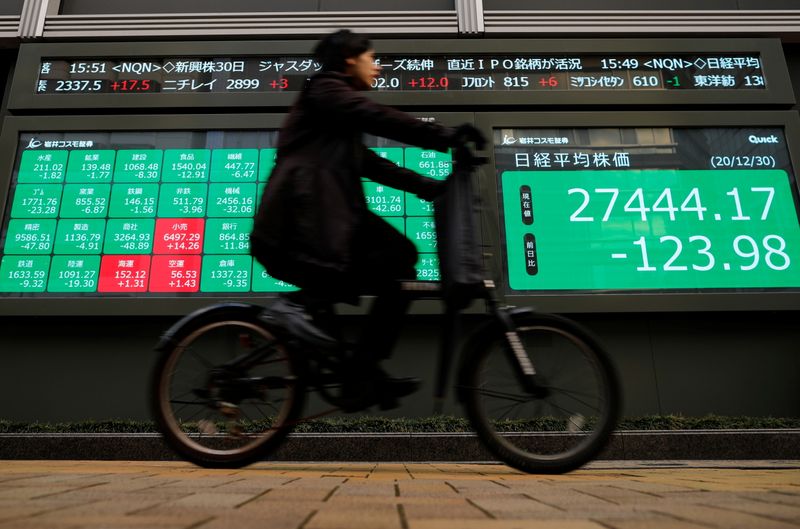
© Reuters. FILE PHOTO: Display shows Nikkei share common and inventory indexes exterior a brokerage in Tokyo
By Andrew Galbraith and Chibuike Oguh
SHANGHAI/NEW YORK (Reuters) – Asian shares stumbled decrease in afternoon commerce on Friday, reversing earlier positive aspects as rising COVID-19 instances in China strengthened investor issues over the prospects for a world financial restoration.
European bourses had been set to open decrease. Pan-region dropped 0.66% in early commerce, whereas German misplaced 0.65% and futures dipped 0.35%.
Earlier on Friday, an Asian regional share index had edged close to file highs after U.S. President-elect Joe Biden proposed a $1.9 trillion stimulus plan to jump-start the world’s largest economic system and speed up its response to COVID-19.
In prime-time remarks, Biden outlined a proposal that features $415 billion aimed on the COVID-19 response, some $1 trillion in direct aid to households, and roughly $440 billion for small companies and communities laborious hit by the pandemic.
However that preliminary enhance pale by the afternoon as threat urge for food waned, lifting bond costs and the greenback, and hitting regional equities.
“While you get to those lofty ranges, what does it must take (the market) larger once more?” stated Stephen Innes, chief international markets strategist at Axi.
“In the end, the market has excelled itself. I am not saying it is gotten too far over its skis, I do not assume it has, however I feel the expectations for financial repricing are fairly dramatic … (we’re) again once more to the shortage of financial conviction.”
World shares had initially firmed on Thursday on a report that the stimulus bundle could possibly be as massive as $2 trillion, way more than markets had been anticipating.
Biden’s feedback got here after Federal Reserve Chair Jerome Powell struck a dovish tone in feedback at a digital symposium with Princeton College.
Powell stated the U.S. central financial institution will not be elevating rates of interest anytime quickly and rejected strategies the Fed would possibly begin lowering its bond purchases within the close to time period.
MSCI’s broadest index of Asia-Pacific shares exterior Japan was final down 0.59%.
Chinese language blue-chips shed 0.97% amid worries over rising COVID-19 instances in China, and after the Chinese language central financial institution drained liquidity from the nation’s banking system, suggesting a tightening bias in financial coverage.
Greater than 28 million persons are underneath lockdown in China. On Friday it reported the very best variety of new COVID-19 instances in additional than 10 months.
Hong Kong’s fell 0.29% and Australia’s was flat, whereas misplaced 0.65% after touching three-decade highs within the earlier session.
The falls in Asia echoed a late dip on Wall Road on Thursday. Whereas U.S. shares spent a lot of the buying and selling session in constructive territory, helped by the stimulus hopes, issues over the price of the bundle led to a modest decline towards the tip of Wall Road commerce.
shed 0.61% to three,768.
“The priority is what it should imply from a tax stand level,” stated Tim Ghriskey, chief funding strategist at Inverness Counsel in New York.
“Spending is straightforward to do however the query is how are you going to pay for it? Markets usually ignore politics however they do not usually ignore taxes.”
The fell 0.22%, the misplaced 0.38%, and the dropped 0.12%.
On Friday, earnings season will kick into full swing with outcomes from JPMorgan (NYSE:), Citigroup (NYSE:) and Wells Fargo (NYSE:). Buyers might be trying to see if banks are beginning to take down credit score reserves, resume buybacks, and supply steering that exhibits the economic system is enhancing, stated Thomas Hayes, chairman of Nice Hill Capital in New York.
Within the forex market, the U.S. greenback was flat in opposition to the yen at 103.79 and the edged 0.1% larger to 90.35.
The euro fell 0.16% to $1.2136.
U.S. yields stepped again as threat urge for food waned. Benchmark yielded 1.1005%, down from a U.S. shut of 1.129% on Thursday, whereas the 30-year yield dipped to 1.8409% from 1.874%.
Oil costs, which had risen on a weak greenback and robust Chinese language import information, dropped as COVID-19 issues in China hit sentiment.
futures fell 0.83%, to $55.95 a barrel whereas misplaced 0.54% to $53.28.
rose 0.11% to $1,848.36 per ounce.






